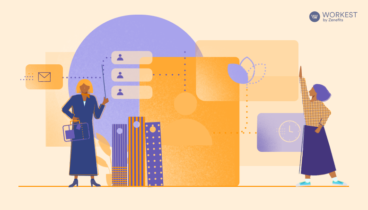Just how important is it to educate your employees on health care for open enrollment? Just ask your younger workers– they might be seeking education.

With more people launching careers as freelancers, entrepreneurs, contractors, and independent workers, understanding open enrollment is more important than ever. Although a large percentage of millennial workers require or want their own insurance through the marketplace, not many millennials feel confident in their own knowledge of the process.
Here’s an overview of the information gap between younger employees and older employees when it comes to open enrollment — and why it’s so important that all workers get educated.
What do Millennials Know about Open Enrollment?
While younger employees need insurance just as much as older employees, studies show that the millennial generation is largely uncertain about the healthcare options available to them. A recent study found that 82% of workers feel prepared for open enrollment.
In the breakdown of these individuals, however, only 69% of millennial workers reported that they felt knowledgeable and prepared regarding the options available to them. Furthermore, just 36% of all the workers surveyed agreed that they’d use an internet tool to research health care plan options. Yet, over 50% of millennial workers said they’d use a digital tool to educate themselves.
This shows that while millennials might be less informed about open enrollment, they’re more willing than their older or younger counterparts to seek information regarding their healthcare — providing a major opportunity for employers to step in and educate them.
The main rule to remember is to keep things simple, digestible, and approachable. Health care is complicated, but it’s crucial to understand.
How do I Educate my Employees on our Offered Health Care plans?
There are many ways to educate your employees on open enrollment; in particular, the offered health care plans your company provides. The main rule to remember is to keep things simple, digestible, and approachable. Health care is complicated, but it’s crucial to understand.
Using sophisticated language and jargon might cause your employees to get lost and confused, which might make them less open to the idea of learning. For further help, check out our health care terminology glossary.
Plus, it’s also a good idea to include information about savings potential. Many Americans don’t have enough in their bank account to supplement an additional $1,000 of funds for out-of-pocket expenses, but the right healthcare plan can help you stay covered and save money to avoid this situation.
The Benefits of Educating Employees
When employees aren’t sure about the options available to them regarding health care, they may not choose the best option to suit their needs. In turn, this means they might end up paying more money for a healthcare plan that doesn’t suit their needs properly, or that simply comes with too many additional services that the person doesn’t need. Moreover, when someone chooses a healthcare plan that’s too robust for them, the employer winds up paying excess money that they don’t need to be paying.
The good news is that educating your employees can prevent this from happening. When people receive the benefits they need at a good price, they’ll stay happy, satisfied and healthy. This setup might also protect your company against high turnover rates, too: a study by America’s Health Insurance Plans reports that 56% of employees stayed with their job because of great access to health care.





